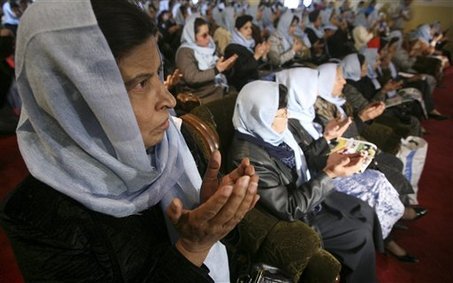
One small step for the rabble-rousers.
President Karzai underestimated the global attention that legalizing rape in Afghanistan would cause. Karzai's rape law has now been put on hold. Being a signatore of the Universal Declaration of Human Rights means something. Especially when you have the American President calling you out openly, as Barack Obama did by calling Karzai's rape law "abhorrent." On behalf of all women, thank you, Mr. President.
However, this battle for women's rights in countries where fundamentalist extremists rule will remain a one baby step at a time reality. We'll take any win we can get.
Placating extremism has its price in a world that thrives on information and globalized reporting. Things that slid by in the 20th century won't be so easy to hide today. That includes the subjugation of women's civil rights no matter the reason, but especially if it's for political purposes and done by a leader whose slipping because of corruption and incompetence.
A controversial law condoning marital rape and reintroducing Taleban-era rules for Afghan women has been shelved after an outcry in the West.
The Afghan Foreign Ministry said that the law had not been enacted, while Justice Ministry officials said that its contents might be reconsidered. The legislation was put on hold pending a review.
"The Justice Ministry is reviewing the law to make sure it is in line with the Afghan Government's commitment to human rights and women rights conventions," Sultan Ahmad Baheen, a spokesman for the ministry in Kabul, said. [..]
As the article above states, Article 22 of the Afghan Constitution also explicitly reiterates the equality of men and women before the law.
The sad truth, as stated by one female Afghan MP, is that many women today in Afghanistan are ignorant and don't know their rights, even as young girls fight to get to school. They don't know that they can be religious without being made to act against their will.
Previous generations of women may be lost, but it also explains the state of Afghanistan today. Because you can't have a stable country without women participating. People, especially progressives saying we should abandon Afghanistan, should think about this before they fight to stand against President Obama's new Af-Pak policy.
What we're fighting for has nothing to do with the Bush-Cheney doctrine of preemption, occupation and forced democracy. You cannot talk democracy in a nation whose president thought he could get away with codifying rape against women.
President Obama's intentions lean heavily on civilian aid to help Afghans build up the civil society so that terrorists can't rip the foundation of daily life away from the Afghan people. Not demanding ending of poppy growing, but finding other ways to work with the Afghans that doesn't threaten their only livelihood, though alternatives must be proposed, though not forced.
Just perhaps, as Scott Wilson suggests, we should be looking at lessons from Columbia.
... The conflicts in Colombia and Afghanistan share far more similarities with one another than either does with Iraq, which I covered in 2003 and 2004. The Taliban have caves and Colombian guerrillas their triple-canopy jungle and mountain hideouts -- terrain far more useful to insurgencies than Iraq's desert. Afghanistan's opium poppies fund the Taliban, just as coca fuels Colombia's guerrillas. As Pakistan does for the Taliban, Venezuela and Ecuador provide sanctuary to Colombia's insurgents.
Perhaps the most important parallel, though, is the lack of a strong central government. Colombia's government has rarely held sway beyond Bogota's nearly two-mile high plateau, and the frail Karzai administration in Kabul has a similarly short reach. As a result, Colombia has relied on brutal paramilitary forces to support a weak army, alienating much of the population in the process. In Afghanistan, that role is played by U.S. forces, which, although by no means as savage as the Colombian irregulars, have cost Afghanistan's government support among a people famously hostile to foreign invaders. ... (read on)
But above all else we should be supporting President Obama's Af-Pak strategy. It's worth a shot.

